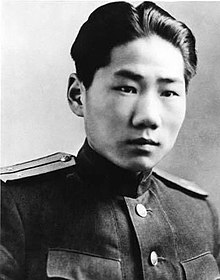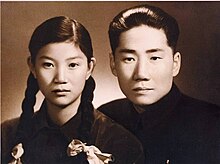| Mao Anying | |
|---|---|
 Mao Anying in a Soviet officer's uniform Mao Anying in a Soviet officer's uniform | |
| Native name | 毛岸英 |
| Born | (1922-10-24)24 October 1922 Xiangya Hospital, Changsha, Hunan, Republic of China |
| Died | 25 November 1950(1950-11-25) (aged 28) Tongchang, North Pyongan, North Korea |
| Allegiance | |
| Rank | |
| Battles / wars | World War II Chinese Civil War Korean War † |
| Spouse(s) |
Liu Songlin (m. 1949) |
| Relations | Mao Zedong (father) Yang Kaihui (mother) |
| Mao Anying | |||||||||
|---|---|---|---|---|---|---|---|---|---|
| Chinese | 毛岸英 | ||||||||
| |||||||||
Mao Anying (Chinese: 毛岸英; pinyin: Máo Ànyīng; 24 October 1922 – 25 November 1950) was a Chinese military officer. He was the eldest son of Mao Zedong and Yang Kaihui. Educated in Moscow and a veteran of multiple wars, Mao was killed in action by an air strike during the Korean War.
Early life
Mao was born at Central South University Xiangya Hospital in Changsha, Hunan Province. His mother, Yang Kaihui, the second wife of Communist Leader Mao Zedong, was executed by the Kuomintang in 1930. He and his younger brother, Mao Anqing, escaped to Shanghai. Their father was in Jiangxi province at the time. They were enrolled in the Datong Kindergarten, which was run covertly by the Chinese Communist Party for the children of CCP leaders and operated by Dong Jianwu under the alias "Pastor Wang". In 1933, after the Kuomintang expulsion of the CCP from the Jiangxi Soviet, support for the Datong Kindergarten dried up, and Mao and his brother ended up on the streets.
World War II
In 1936, Mao was located by Dong and Kang Sheng and taken to Moscow, where he was enrolled with his brother Anqing at Interdom in the Soviet Union under the name "Sergei Yun Fu". His stepmother, He Zizhen, would join them there after being wounded in battle; although Mao's father had left his mother for He, Anying had a good relationship with their half-sister Li Min, who joined them in 1941.
During the Second World War, Anying successfully petitioned Joseph Stalin to allow him and his brother Anqing to join the Soviet Red Army. Mao graduated from the Frunze Military Academy and the Lenin Military-Political Academy in 1943 and served as a deputy politics department commander of a tank platoon for the 1st Belorussian Front in the fight against the Third Reich in Poland, Czechoslovakia, and the final Battle of Berlin.
Following VE Day, Anying was re-assigned to the Soviet Far East, where he took part in the Soviet-Japanese War. During the Manchurian Strategic Offensive Operation, he was praised for his role during military operations in Chahar Province and the Greater Khingan Range, for which he received the Soviet military decorations of the Order of the Red Star and the Medal "For Battle Merit".
In 1946, Mao returned to Yan'an, where he served under Kang Sheng in fighting against the Kuomintang and defeating them in Shanxi Province, reaching the rank of Major General in the People's Liberation Army. Upon his return to Beijing, Mao became a Secretary and Translator for Li Kenong in the CCP's intelligence bureau, the Central Social Affairs Department (SAD), and also the Deputy Secretary of the CCP Branch for the Beijing General Machinery Factory.
Korean War and death

In June 1950, Mao requested to join the Chinese People's Volunteer Army (PVA) as an officer in the Korean War. PVA commander Peng Dehuai and other high-ranking officers, fearing Mao Zedong's reaction if his favorite son was to be killed in combat, had long opposed allowing Mao to join the PVA and tried to prevent him from entering. Mao Zedong overrode Peng, who allegedly shouted, "He is Mao Zedong's son. Why should it be anything else?" Peng instead had Mao assigned to himself as his secretary and Russian translator, under the pseudonym "Secretary Liu" at the PVA headquarters, located in caves near an old gold mining settlement in Tongchang County. This location offered excellent protection from United Nations (UN) air attacks and was far from the front lines of the war. However, the safety was an illusion, as the US Air Force completely controlled the airspace. On the evening of 24 November, two UN aircraft, P-61s on a photo reconnaissance mission, were seen overhead. According to multiple Chinese eyewitnesses, sometime between 10:00 am and noon on 25 November, four Douglas B-26 Invaders dropped napalm bombs in the area. One of the bombs destroyed a makeshift building near the caves, killing Mao and another officer, Gao Ruixin. Several conflicting reasons have been given as to why Mao was in the building, including suggestions that he was cooking food during daylight, in violation of Chinese Army regulations, fetching documents, or sleeping late due to night duties, which had led to him missing breakfast. Another reason given was that due to the high amount of communications, being the PVA headquarters, the Americans were able to combine aerial reconnaissance with the direction of radio waves, to identify its location.

Peng witnessed the explosion nearby and, realizing Mao was in danger, tried to run towards him but was physically restrained by his guards. Peng screamed, "if you don't let go, I'll kill you!" to which the guard responded, "if you kill me, I still won't let go". Mao's body was reportedly burnt beyond recognition and was only identifiable through a Soviet watch given to him by Joseph Stalin. Peng immediately reported Mao's death to the Central Military Commission, but Zhou Enlai, Liu Shaoqi, and Yang Shangkun ordered the CMC and Politburo not to inform Mao Zedong. Only in January 1951, when Mao Zedong asked his personal secretary Ye Zilong to have Mao transferred back to China, Ye informed him of the news. Mao was buried in Pyongyang, in the Cemetery for the Heroes of the Chinese People's Volunteer Army.
Some Chinese citizens and groups who oppose Mao Zedong commemorate the anniversary of Mao Anying's death by eating egg fried rice. According to some sources, on the morning of 25 November 1950, Mao Anying, alongside staff officers Gao Ruixun and Cheng Pu, cooked egg fried rice for breakfast in the office of Peng Dehuai, despite orders only to cook at night for fear of American air raids. It is alleged that their preparation of that meal drew the attention of American bombers, contributing to the deaths of Mao and Gao.
The fried rice story of Anying's death has never been confirmed. The Chinese Academy of History, a state-run historical research institute set up in 2019, had denounced the story as rumors spread by those who aimed to disrespect Mao Anying's sacrifice to his country. The academy, citing declassified documents, stated Mao's position was compromised when the camp's radio transmissions were being intercepted.
"Egg fried rice protests" are a form of internet protest used by Chinese users occurring yearly around 24 October, Anying's birthday, or around 25 November, the date of his death. Posting recipes for egg fried rice is meant to mock the death of Anying; such posts are usually blocked or taken down by Chinese officials and can lead to sanctions against those involved.
Disputes regarding death
The only units operating the B-26 in Korea at the time were the 3rd Bomb Group and 452nd Bomb Group, of the United States Air Force (USAF). Some accounts have claimed, most likely incorrectly, that the pilot responsible was Captain G. B. Lipawsky of the South African Air Force. However, the only aircraft flown by South African pilots in Korea was the Mustang fighter bomber, which was unlikely to have been mistaken for the larger, twin-engine B-26s.
See also
References
- ^ Chairman Mao Zedong and General Mao Anying, Chinese Military Leaders of the Korean War
- Oxana Vozhdaeva (4 October 2013). "How children of the world united at a Soviet school". BBC News. Retrieved 4 October 2013.
Mao's eldest son, Mao Anying, who was known in the home as Sergei Yun Fu.
- Pathanothai, Sirin. The Dragon Pearl. Simon and Schuster. 1994. p 163.
- ^ "No Dynasty for China: How Mao's Son Was Killed in the Korea War". National Interest. 25 April 2020.
- ^ Egorov, Boris (17 December 2021). "How Mao Zedong's son fought for the USSR against the Nazis". Russia Beyond. Retrieved 11 August 2022.
- Kruschev, Nikita. Memoirs of Nikita Kruschev, Vol 2. Pennsylvania State University Press. 2006. p. 98.
- "参谋与毛岸英一同葬身火海 遗腹女身世被瞒46年_新闻中心_新浪网". news.sina.com.cn. Retrieved 30 July 2021.
- ^ "彭德怀文革时被污有意害死毛岸英". Cul.sohu.com. Retrieved 13 November 2014.
- ^ Sebastien Roblin, 2017, "A U.S. Bombing Run in North Korea Wiped Out Mao Zedong's Dynasty" National Interest (7 May), (Access: 17 March 2018.)
- 武立金 (2006). "第六章 血染大榆洞". 毛岸英在朝鲜战场 (in Chinese (China)). 作家出版社. ISBN 978-7-5063-3717-5.
- Nanchu, Xing Hang, Page 94, McFarland Press, 2003, In North Korea: an American travels through an imprisoned nation ISBN 0-7864-1691-2, ISBN 978-0-7864-1691-2
- 彭徳怀传记编写组 (1994). Yi-ge zhenzheng de ren Peng Dehuai (1st ed.). Beijing: Ren min chu ban she. ISBN 7-01-002005-1. OCLC 33378849.
- 《当代中国人物传记》丛书编辑部, ed. (1993). 《彭德怀传》 [Biography of Peng Dehuai] (in Chinese (China)) (1st ed.). Beijing: Dangdai Zhongguo chubanshe. ISBN 7-80092-102-6. OCLC 28982336.
- "朝鲜战争史料:彭德怀发了火". Archived from the original on 1 March 2014. Retrieved 31 July 2013.
- ^ Cosh, Colby (9 November 2021). "Colby Cosh: Why posting about egg fried rice could land you in a Chinese jail". National Post. Retrieved 15 November 2021.
- "Holiday of the Week: Chinese Thanksgiving". China Digital Times. 24 November 2016. Archived from the original on 1 December 2016.
- Osnos, Evan (10 November 2021). "Does Xi Jinping's Seizure of History Threaten His Future?". The New Yorker. ISSN 0028-792X. Retrieved 4 September 2023.
- Wong, Chun Han; Zhai, Keith (15 June 2021). "China Repackages Its History in Support of Xi's National Vision". Wall Street Journal. ISSN 0099-9660. Retrieved 4 September 2023.
- "B-26 Invader in Korea". National Museum of the U.S. Air Force.
- 66年前的今天:波兰裔南非飞行员杀害毛岸英. 网易新闻. 25 November 2016 (22 March 2017). A translated excerpt: "G. B. Lipawsky ... accumulated more than 12,000 hours of flight in World War II and North Korea. On November 24th, 1950 ... he ... attacked the command post of the Volunteers using napalm bombs."
- 1922 births
- 1950 deaths
- Children of Mao Zedong
- Chinese people of World War II
- Chinese military personnel killed in the Korean War
- Soviet military personnel of World War II
- Chinese expatriates in the Soviet Union
- Frunze Military Academy alumni
- Deaths by American airstrikes
- People from Changsha
- Heroes of the Republic (North Korea)
- Recipients of the Order of the Red Star
- Foreign Communist Party of the Soviet Union members
- 20th-century Chinese military personnel